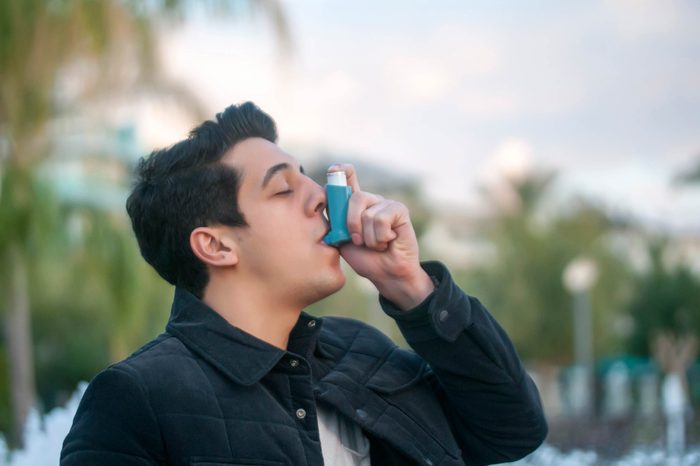
You take blood pressure medication
If you recently started a new blood pressure medication regimen using ACE inhibitors, it could cause your cough to stick around for longer than you’d like. “A cold isn’t the only thing that causes a chronic cough,” says Norman Edelman, MD, senior scientific advisor for the American Lung Association. “The first thing we do is look at [your] medications.” At least 20 percent of patients develop a dry cough from ACE inhibitors within a week of starting their medication, but sometimes it can take six months to appear. The link between ACE inhibitors and a cough remains a mystery. But some doctors suspect it may be induced by an accumulation of irritants that stimulate the airways called bradykinin, substances that are usually metabolized by ACE. If the cough persists, consult your doctor about getting a new blood pressure medication. If you don’t need medication to lower your blood pressure just yet, consider eating these healthy foods to lower high blood pressure.

You have asthma
“Most commonly, people with asthma experience symptoms of shortness of breath, chest tightness, wheezing, and cough,” says Rachel Taliercio, DO, a pulmonologist at the Cleveland Clinic in Ohio. “But some people with asthma have cough as their only symptom, chronic cough can be caused by asthma.” In fact, more than 90 percent of chronic cough cases (classified as a cough that lasts for eight weeks or longer) are caused by asthma, allergies, or acid reflux disease. If you experience a coughing fit that just won’t quit, visit your doctor to find out if you’re sick or if an underlying health condition is to blame. (Here’s what you can do about winter allergies.)

You don’t treat your cold
The most common misconception that doctors see is the notion that a cough should go away by itself within a week, says Dr. Edelman. In reality, it can last for several weeks after a cold seemingly disappears. A cold virus attacks your body in various ways (no two colds are the same), from congesting your airways to causing inflammation in the nose and sinuses. That sinus inflammation can cause postnasal drip, which triggers a lingering cough after a viral infection. Minimize your cough symptoms as much as possible with over-the-counter medications. “The only thing that’s proven to handle a chronic cough related to a viral infection, asthma, or allergies are first-generation antihistamines,” says Dr. Edelman. “If you take enough of that, it’ll suppress your cough.” Try these natural cough treatments for relief.

You don’t take care of your body
It’s important to get seven to eight hours of sleep every night and eat a healthy diet when you’re sick to help boost your body’s immune system. “Take good care of yourself so your body can kick it,” says Jennifer Beach, MD, attending physician in the Division of General Internal Medicine at Beth Israel Deaconess Medical Center in Boston, Massachusetts. Rest when you first get sick as physical activity can impair breathing, trigger asthma and dampen your immune system when you need it most. Once the infections clears and you’re left with a residual runny nose and cough, aim for mild to moderate exercise (remain indoors if it’s extremely hot or cold outside) .Try some of these 51 health tips you’ll want to make a habit.

You have heartburn
Acid reflux is a common cause of chronic coughing, but there’s also been some debate over the link. Some experts think that reflux-inducing foods that cause heartburn can make your cough worse. “Reflux disease, also called heartburn, can be a cause of chronic cough,” says Dr. Taliercio. “If you have heartburn you want to avoid food and drinks that can make reflux worse such as alcohol, caffeine, chocolate, and spicy meals. It is also important not to eat at least two hours before bedtime.”

You overuse nasal sprays
Some nasal decongestant sprays like Afrin are great for a runny nose, but you should limit your use to no more than three days in a row to avoid a “rebound effect,” which can cause a cough. The excessive spraying exacerbates your coughs, congestion, and postnasal drip by making your nasal membranes swell. “Rebound hyperemia is a rebound effect that makes you continue to use it. You get addicted to it,” says Dr. Beach. Your best bet may be to try a dual-purpose pill that contains both an antihistamine and a decongestant; this dynamic duo clears up mucus and opens up your airways all at once. These are the 10 medical reasons for your persistent coughing.

You suffer from a lingering post-cold cough
A post-inflammatory bronchospasm is another type of post-cold cough that bears an uncanny resemblance to asthma. Your airways tighten, causing you to wheeze and cough just like an asthmatic person would, except it’s actually just an unfortunate symptom of a cold. Doctors will often prescribe you asthma medications like bronchodilators or steroids for up to four weeks to help you fight it off. Spot these other clear signs that a cold is coming.

You don’t drink enough fluids
Hot tea or water helps thin out the mucus in your airways, which quells your cough. “It doesn’t make the cough go away, but it makes it feel better,” says Dr. Edelman. “It’s more comfortable to have a wet cough than a dry one.” You could also try using a humidifier in your room to moisten your airways as you sleep. Here’s how to choose the best humidifier for your space.
